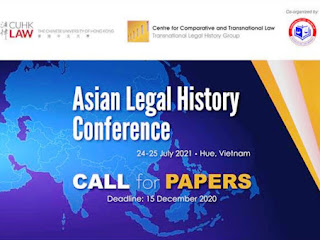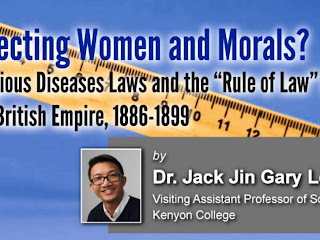[We have the following announcement and CFP. DRE]
The Transnational Legal History Group of the Centre for Comparative and Transnational Law (CCTL) and the University of Law - Hue University will be jointly organizing a conference on the theme of Asian Legal History at the University of Law - Hue University, Hue, Vietnam, on 24-25 July 2021. Convened by Bui Ngoc Son and Christopher Roberts, Assistant Professors at CUHK LAW, the conference aims to bring together a diverse and interdisciplinary group of scholars, researchers, and graduate students to share their research findings on topics relating to legal history in Asia.
Confirmed Keynote Speakers:
Andrew Harding, Visiting Research Professor, National University of Singapore, Faculty of Law
Pip Nicholson, Dean, William Hearn Professor of Law, Melbourne Law School
Radhika Singha, Professor of Modern Indian History, Jawaharlal Nehru University
Lutz-Christian Wolff, Dean, Wei Lun Professor of Law, CUHK LAW
Call for Papers:
The organizers invite proposals for individual papers and panels. Submissions on any subject, providing it pertains to legal history in Asia, will be considered. General topics may include:
The historical evolution of common law, civil law, and socialist law traditions in Asia;
Legal pluralism and jurisdictional clashes;
Dynastic law;
Colonial law;
Customary law and village law;
Buddhist Law, Confucian Law, Hindu Law, and Islamic Law;
The history of a particular area of law (constitutional law, property law, criminal law, etc);
Theoretical and methodological issues involved in studying Asian legal history.
The conference organizers are particularly interested in papers addressing the following subjects:
Asian approaches to and impacts upon the historical development of international law;
Transnational legal history;
The relationship between metropolitan and colonial approaches to law;
The history of law, gender and sexuality;
The evolution of, and contestations around, legal positivism;
The history of law schools and of the formation of the judiciary and of members of the legal profession;
The history of public order law;
The history of law and violence.
Individual paper proposals should include a 300-word abstract and the author’s contact information. Panel proposals should include a 300-word description of the panel, 300-word abstracts of three to four individual papers, contact information for each person on the panel, and contact information for the chairs of the panel.
Registration Fee: HK$ 200 per participant. Conference organizers will provide two lunches, one dinner, and refreshments. Participants are responsible for their own travel and accommodation costs.
Important dates:
5 October 2020: Online abstract submission opens
15 December 2020: Abstract submission deadline
15 February 2021: Notification of acceptance
15 March 2021: Registration opens
30 April 2021: Early registration and payment closes
25 June 2021: Regular registration and payment closes
24-25 July 2021: The conference takes place
Please submit the abstracts via online form by 15 December 2020. For enquiries, please contact the CCTL at cctl.law@cuhk.edu.hk.





